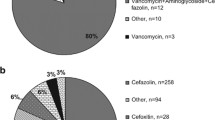Abstract
Purpose
Establishment of evidence-based best practices for preventing surgical site infection (SSI) in neonates is needed. SSI in neonates, especially those with a low birth weight, is potentially life-threatening. We aimed to identify risk factors associated with SSI in neonates.
Methods
A retrospective review was performed using 2007–2016 admission data from our institution. Neonatal patients who were admitted to the neonatal intensive care unit and underwent surgery were evaluated for a relationship between development of SSI and perinatal or perioperative factors and methicillin-resistant Staphylococcus aureus (MRSA) colonization during hospitalization.
Results
One hundred and eighty-one patients were enrolled in this study. Overall SSI incidence was 8.8%. Univariate analysis showed that SSI was significantly more frequent in both patients with contaminated or dirty wound operations and patients with MRSA colonization during hospitalization. Both of these factors were identified as independent risk factors for SSI by multivariate analysis [hazard ratio (HR): 6.1, 95% confidence interval (CI) 2.0–19.9; HR: 3.3, 95% CI 1.1–10.4, respectively].
Conclusions
This study identified contaminated or dirty wound operations and MRSA colonization during hospitalization as risk factors for SSI in neonates. MRSA colonization may be a preventable factor, unlike previously reported risk factors.
Similar content being viewed by others
References
Horan TC, Andrus M, Dudeck MA (2008) CDC/NHSN surveillance definition of health care-associated infection and criteria for specific types of infections in the acute care setting. Am J Infect Control 36:309–332
Leaper DJ, van Goor H, Reilly J (2004) Surgical site infection—a European perspective of incidence and economic burden. Int Wound J 1:247–273
Segal I, Kang C, Albersheim SG et al (2014) Surgical site infections in infants admitted to the neonatal intensive care unit. J Pediatr Surg 49:381–384
Lejus C, Dumont R, Gall CL et al (2013) A preoperative stay in an intensive care unit is associated with an increased risk of surgical site infection in neonates. J Pediatr Surg 48:1503–1508
Vu LT, Vittinghoff E, Nobuhara KK et al (2014) Surgical site infections in neonates and infants: is antibiotic prophylaxis needed for longer than 24 h? Pediatr Surg Int 30:587–592
Clements KE, Fisher M, Quaye K et al (2016) Surgical site infections in the NICU. J Pediatr Surg 51:1405–1408
Garner JS (1986) CDC guideline for prevention of surgical wound infections, 1985. Supercedes guideline for prevention of surgical wound infections published in 1982. Revis Infect Control 7:193–200 (originally published in 1995)
Horan TC, Gaynes RP, Martone WJ et al (1992) CDC definitions of nosocomial surgical site infections, 1992: a modification of CDC definitions of surgical wound infections. Infect Control Hosp Epidemiol 13:606–608
Umscheid CA, Mitchell MD, Doshi JA et al (2011) Estimating the proportion of healthcare-associated infections that are reasonably preventable and the related mortality and costs. Infect Control Hosp Epidemiol 32:101–114
Berríos-Torres SI, Umscheid CA, Bratzler DW, Healthcare Infection Control Practices Advisory Committee et al (2017) Centers for disease control and prevention guideline for the prevention of surgical site infection, 2017. JAMA Surg 152:784–791
World Health Organization (2016) Global guidelines for the prevention of surgical site infection. World Health Organization, Geneva
Katayanagi T (2015) Nasal methicillin-resistant S. aureus is a major risk for mediastinitis in pediatric cardiac surgery. Ann Thorac Cardiovasc Surg 21:37–44
Huddleston CB (2004) Mediastinal wound infections following pediatric cardiac surgery. Semin Thorac Cardiovasc Surg 16:108–112
Walrath JJ, Hennrikus WL, Zalonis C et al (2016) The prevalence of MRSA nasal carriage in preoperative pediatric orthopaedic patients. Adv Orthop 2016:5646529
Shimizu A, Shimizu K, Nakamura T (2008) Non-pathogenic bacterial flora may inhibit colonization by methicillin-resistant Staphylococcus aureus in extremely low birth weight infants. Neonatology 93:158–161
Uehara Y, Kikuchi K, Nakamura T et al (2001) H(2)O(2) produced by viridans group streptococci may contribute to inhibition of methicillin-resistant Staphylococcus aureus colonization of oral cavities in newborns. Clin Infect Dis 32:1408–1413
Uehara Y, Kikuchi K, Nakamura T et al (2001) Inhibition of methicillin-resistant Staphylococcus aureus colonization of oral cavities in newborns by viridans group streptococci. Clin Infect Dis 32:1399–1407
Mitsuoka T (2014) Establishment of intestinal bacteriology. Biosci Microbiota Food Health 33:99–116
Acknowledgements
We thank Sarah Bubeck, Ph.D., from Edanz Group (http://www.edanzediting.com /ac), for editing a draft of this manuscript.
Author information
Authors and Affiliations
Corresponding author
Ethics declarations
Conflict of interest
The authors declare that they have no conflict of interest.
Ethical approval
For this type of study formal consent is not required.
Informed consent
Written informed consent was obtained from all parents or guardians of patients enrolled in this study.
Rights and permissions
About this article
Cite this article
Inoue, M., Uchida, K., Ichikawa, T. et al. Contaminated or dirty wound operations and methicillin-resistant Staphylococcus aureus (MRSA) colonization during hospitalization may be risk factors for surgical site infection in neonatal surgical patients. Pediatr Surg Int 34, 1209–1214 (2018). https://doi.org/10.1007/s00383-018-4338-x
Accepted:
Published:
Issue Date:
DOI: https://doi.org/10.1007/s00383-018-4338-x




